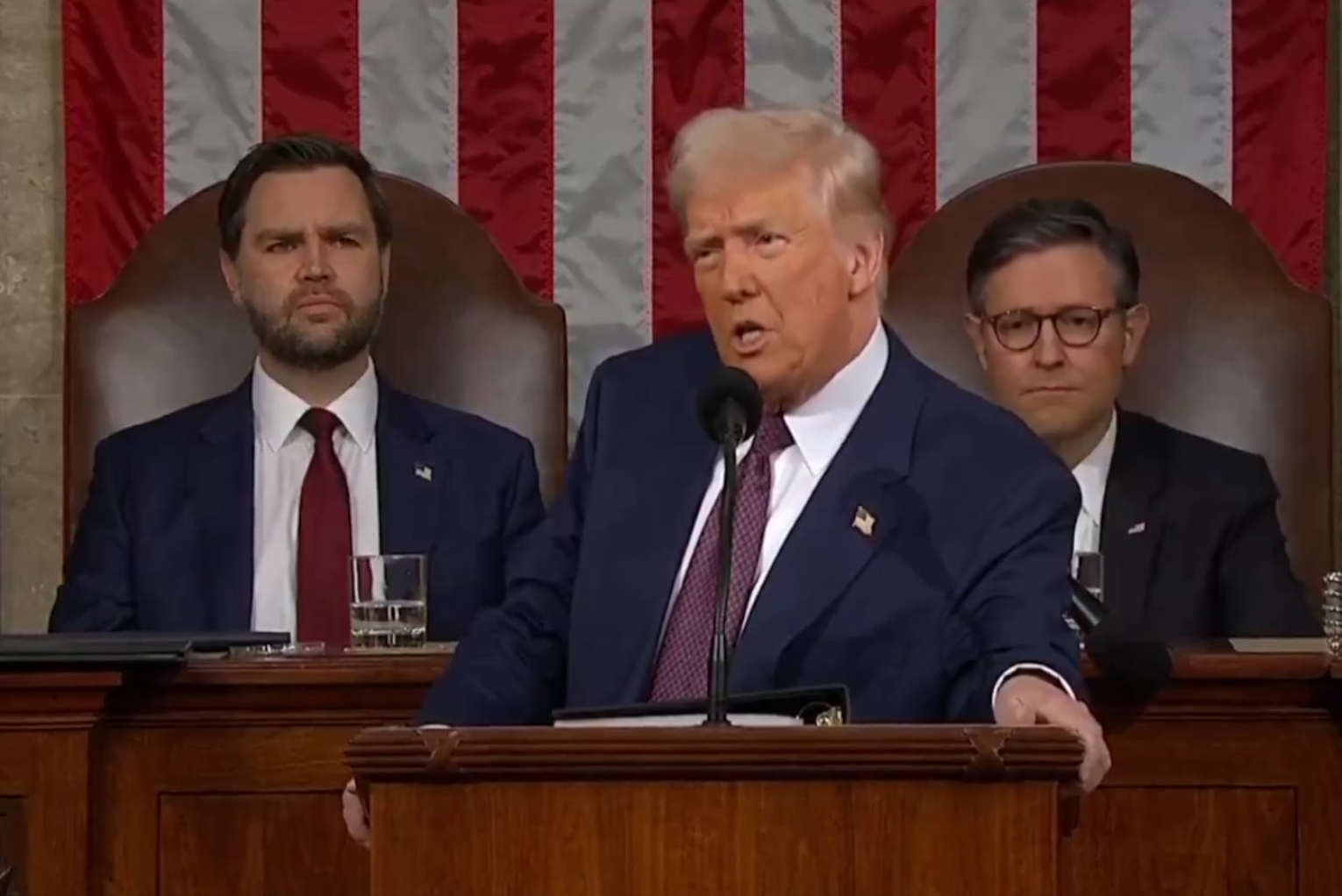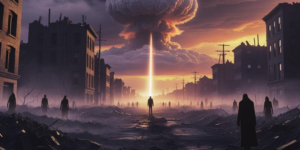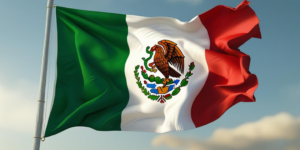Prophecy or Coincidence? 19th-Century Novel ‘The Last President’ and Trump’s Tariff Battles
As President Donald Trump’s controversial tariff plan roils world markets, the curious 19th century novels of an obscure author and lawyer has created a prophetic mind-twister for those who enjoy literary mysteries.
While many in the mainstream media scramble to understand the deeper implications of Trump’s economic revival plan, those with spiritual discernment recognize a divine thread connecting this moment in history to a powerful vision cast over a century ago—woven through the enigmatic pages of The Baron Trump Collection by Ingersoll Lockwood—and the leadership of President William McKinley, Trump’s often-quoted inspiration, who served from 1897 until his assassination in 1901.
In the third and final book of Lockwood’s eerily prescient trilogy, 1900: or The Last President, a fictional Congress debates an urgent economic strategy:
“There was a doubling up too of the tariff on all imported luxuries, for as was said on the floor of Congress, ‘If the silks and satins of American loom and the wines and tobacco of native growth, are not good enough for “my Lord of Wall Street,” let him pay the difference and thank heaven that he can get them at that price.”
More than fiction, this quote, among many in The Baron Trump Collection, as I explore in my book The Trump Code: Exploring Time Travel, Nikola Tesla, the Trump Lineage, and America’s Future, seems prophetic.
Today, President Trump’s “America First” economic agenda mirrors this very sentiment. With renewed tariffs on foreign goods and strategic protections for U.S. manufacturing and farming, Trump’s strategy aims to break the stronghold of global dependency, eliminate the influence of foreign oligarchs over the American middle class, and once again make American labor the envy of the world.
A Divine Disruption
Trump’s tumultuous but ingenious tariff plan is more than an economic strategy—it’s a divine disruption.
The plan could signal the fall of corrupt global financial systems and the rise of a sovereign, reawakened America. I believe we are witnessing a historic reset—where God is shifting power back to the people and preparing the world for revival.
Following Trump’s announcement on April 2—“Liberation Day”—of his global tariff initiative, Treasury Secretary Scott Bessent went on NBC News and articulated a comprehensive economic reset that may well define this next chapter in our nation’s history.
Framed as a revival of American industrial power and a campaign to uplift the forgotten middle class, the plan aims to rebalance economic power from Wall Street to Main Street, and, more importantly, back into the hands of the American people. I believe this is not merely a political maneuver—it’s a prophetic movement.
Bessent called this a transformational moment in U.S. policy, likening it to President Ronald Reagan’s era of reforms. But this time, it goes deeper. President Trump has added a critical new dimension to the use of tariffs—leveraging them not just as revenue tools or protectionist measures but as instruments of national negotiation and global economic realignment.
The economic fallout of China’s entry into the World Trade Organization in 2001 has left scars on American workers. The so-called “China Shock” decimated communities, hollowed out manufacturing, and shifted prosperity overseas. Now, President Trump is seeking to reverse that trend with policies that require fair trade, penalize exploitation, and reward American production.
Trump’s Hero—The ‘Tariff King’ President William McKinley
Trump’s admiration for McKinley—who signed the landmark Tariff Act of 1890—is no secret.
Trump, who renamed North America’s highest peak Mount McKinley in his honor, has often praised McKinley. In his inaugural address, he referred to McKinley as a “great president” who “made our country very rich through tariffs.” Trump dubbed McKinley the “tariff king.”
McKinley’s leadership ushered in a wave of prosperity by shielding American industries from unfair global competition. Ironically, 1890 was also the year Lockwood published the Travels and Adventures of Little Baron Trump and His Wonderful Dog Bulger, the first in a trilogy that chronicles the rise of a populist president—whom many now believe is President Trump—his unusual journey, and a chaotic political atmosphere eerily similar to what we face today.
In The Trump Code, I explore how these bizarre literary prophecies, historical connections, and Trump’s policies are not random—but part of what I believe is the hand of Providence shaping the destiny of America and the world. The uncanny similarities suggest that the United States stands at a prophetic crossroads. Will we return to our founding principles, or descend further into the grip of globalism?
The End of America’s Exploitation?
President Trump’s recent announcements—including a sweeping plan to levy tariffs on nations that exploit American consumers and undercut U.S. jobs—are rooted not only in sound economic reasoning but a deeper spiritual and prophetic mission.
Just as McKinley battled the rising forces of industrial monopolies and foreign manipulation in his day, Trump now confronts a modern version of the same enemies—tech giants, foreign conglomerates, and elite financial interests determined to erase national sovereignty.
‘For the Glory of God and Advancement of the Christian Faith’
But God is not silent.
Through the reelection of President Trump in November 2024, the revival of American tariffs, and the exposure of globalist agendas, the Lord is calling His people to rise in discernment. What seemed like satire in 1900: or The Last President has become a warning flare over the republic. We are witnessing a convergence of prophecy, politics, and the future of America.
As believers, we must be watchful and wise. We must recognize that the battle for America is not just a political one—but spiritual. As I wrote in The Trump Code, this is a prophetic battle.
President Trump’s economic reforms are not merely nostalgic nods to history—they are declarations of war against the Babylonian system that has enslaved generations with debt, dependency, and deception. And like McKinley before him, Trump is choosing to stand in the breach.
The question is: will the Church stand with him?
We are in the midst of a prophetic disruption. I believe the unveiling of President Trump’s plan is a signal that God is not done with America. In fact, He is just getting started.
As I explain in The Trump Code, there is a divine thread running through our history, and I believe President Trump is part of God’s design to expose, uproot and rebuild. America is being called to rise—not in arrogance, but in purpose. Not in chaos, but in covenant with God, like the Pilgrims did when they dedicated America in the Mayflower Compact to the “the glory of God, and advancement of the Christian faith.”
Now is the time to pray, fast and get involved. The economic shifts we are seeing could set the stage for a monumental global realignment. If we heed the signs, we may yet see a great revival rise from the ashes of a broken world.
As the pages of prophecy unfold before our eyes, let us remember: God raises up leaders for times like this. And if The Trump Code is any indication, we are living in an hour of divine intervention and historic consequence.
Let the Church arise. Let America awaken. Let the remnant prepare. The time has come.
Troy Anderson is a Pulitzer Prize-nominated investigative journalist, best-selling author of “The Trump Code,” “Your Mission in God’s Army,” “Revelation 911,” “The Military Guide to Disarming Deception,” “The Military Guide to Armageddon,” “Trumpocalypse” and “The Babylon Code.” He is founder and president of the Inspire Literary Group, a premier editorial services and ghostwriting company. Anderson has appeared on numerous media platforms, including CBN News, Newsmax TV and His Glory TV, and is known for his understanding of prophetic events shaping America’s future. He writes for Newsmax, Charisma Media, The Christian Post, Townhall and other media outlets. Learn more at www.troyanderson.us.




























































